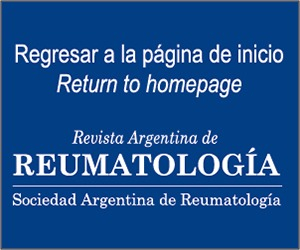Tenosinovitis en artritis reumatoidea, evaluación por ultrasonido y resonancia magnética
Resumen
La tenosinovitis es una manifestación frecuente de la artritis reumatoidea (AR), asociada a la presencia de rupturas tendinosas, discapacidad funcional y procesos erosivos de las articulaciones adyacentes. En los últimos años el manejo clínico de la AR ha sido respaldado por diferentes métodos de evaluación por imágenes, como la ultrasonografía (US) y la resonancia magnética (RM). Estas son herramientas de gran utilidad en la práctica clínica porque permiten la detección precoz de la actividad de la enfermedad y, por lo tanto, un tratamiento oportuno. Por medio de diferentes escalas de evaluación del daño articular y periarticular (como el tendinoso) es posible valorar el estado de la enfermedad y la respuesta al tratamiento. La presente revisión tiene como objetivo describir las escalas de evaluación de la RM y la US en la valoración de la tenosinovitis en pacientes con AR.Citas
I. McCarty DJ. Arthritis and allied conditions. A textbool of Rheumathology. Filadel a: Lea & Ferbirger, 1985. doi. org/10.1002/anr.1780320826.
II. Eshed I, Feist E, Althoff CE, Hamm B, Konen E, Burmester GR, et al. Tenosynovitis of the exor tendons of the hand detected by MRI: an early indicator of rheumatoid arthritis. Rheumatology (Oxford) 2009;48(8):887-91. doi: 10.1093/ rheumatology/kep136.
III. Jain A, Nanchahal J, Troeberg L, Green P, Brennan F. Production of cytokines, vascular endothelial growth factor, matrix metalloproteinases, and tissue inhibitor of metalloproteinases by tenosynovium demonstrates its potential for tendon destruction in rheumatoid arthritis. Arthritis Rheum 2001;44(8):1754-60. doi:10.1002/15290131(200108)44:8<1754::AID-ART310>3.0.CO;2-8.
IV. Alcalde M, D'Agostino MA, Bruyn GA, Möller I, Iagnocco A, Wake eld RJ, et al. A systematic literature review of US de nitions, scoring systems and validity according to the OMERACT lter for tendon lesion in RA and other in ammatory joint diseases. Rheumatology 2012;51(7):1246-60. doi:10.1093/rheumatology/kes018.
V. Danielsen MA. Ultrasonography for diagnosis, monitoring and treatment of tenosynovitis in patients with rheumatoid arthritis. Dan Med J 2018;65(3):B5474. PMID: 29510818.
VI. Kjaer M. Role of extracellular matrix in adaptation of tendon and skeletal muscle to mechanical loading. Physiol Rev 2004;84(2):649-98. doi:10.1152/physrev.00031.2003.
VII. Kastelic J, Galeski A, Baer E. The multicomposite structure of tendon. Connect Tissue Res 1978;6(1):11-23. doi:10.3109/03008207809152283.
VIII. Thorpe CT, Birch HL, Clegg PD, Screen HRC. The role of the non-collagenous matrix in tendon function. Int J Exp Pathol 2013;94(4):248-59. doi:10.1111/iep.12027.
IX. Thorpe CT, Udeze CP, Birch HL, Clegg PD, Screen HRC. Specialization of tendon mechanical properties results from interfascicular differences. J R Soc Interface 2012;9 (76):3108-17. doi:10.1098/rsif.2012.0362.
X. Thorpe CT, Screen HR. Tendon structure and composition. Adv Exp Med Biol 2016;920:3-10. doi:10.1007/978-3-31933943-6_1.
XI. Thorpe CT, Clegg PD, Birch HL. A review of tendon injury: why is the equine super cial digital exor tendon most at risk? Equine Vet J 2010;42(2):174-80. doi:10.2746/042516409X480395.
XII. Chávez-López, MA. Revisión de estructuras, tendones. En: Ventura L. et al. Manual de ecografía musculoesquelética. Ed. Panamericana 2010;17-21.
XIII. Adham-Aboul FK, Hernández-Díaz C. Soft tissue rheumatism. In: Musculoskeletal ultrasonography in rheumatic diseases. El Miedany Y, (Ed.). 1o Ed. Suiza: Springer. 2015; 239-69.
XIV. Latarjet M, Ruiz Liard A. Anatomía Humana. 4o Ed. Vol. 1, Miembro superior. Buenos Aires: Médica Panamericana; 2006. pág. Capítulo 58, Mano; pág 557-589.
XV. Bellis E, Scire CA, Carrara G, Adinol A, Batticciotto A, Bortoluzzi A, et al. Ultrasound-detected tenosynovitis independently associates with patient-reported are in patients with rheumatoid arthritis in clinical remission: results from the observational study STARTER of the Italian Society for Rheumatology. Rheumatology (Oxford) 2016;55(10):1826-36. doi:10.1093/rheumatology/kew258.
XVI. Filippou G, Sakellariou G, Scirè CA, Carrara G, Rumi F, Bellis E, et al. The predictive role of ultrasound-detected tenosynovitis and joint synovitis for are in patients with rheumatoid arthritis in stable remission. Results of an Italian multicentre study of the Italian Society for Rheumatology Group for Ultrasound: the STARTER study. Ann Rheum Dis 2018;77(9):1283-9. doi:10.1136/annrheumdis-2018-213217.
XVII. Micu MC, Berghea F, Fodor D. Concepts in diagnosing, scoring, and monitoring tenosynovitis and other tendon abnormalities in patients with rheumatoid arthritisthe role of musculoskeletal ultrasound. Med Ultrason 2016;18(3):370-7. doi:10.11152/mu.2013.2066.183.mic.
XVIII. Naredo E, Bonilla G, Gamero F, Uson J, Carmona L, Lffon A. Assessment of in ammatory activity in rheumatoid arthritis: a comparative study of clinical evaluation with grey scale and power Doppler ultrasonography. Ann Rheum Dis 2005;64:375-81. doi:10.1136/ard.2004.023929 .
XIX. Amin MF, Ismail FM, El Shereef RR. The role of ultrasonography in early detection and monitoring of shoulder erosions, and disease activity in rheumatoid arthritis patients; comparison with MRI examination. Acad Radiol 2012;19(6):693-700. doi:10.1016/j.acra.2012.02.010.
XX. Axelsen MB, Ejbjerg BJ, Hetland ML, Skjodt H, Majgaard O, Lauridsen UB. Differentiation between early rheumatoid arthritis patients and healthy persons by conventional and dynamic contrast-enhanced magnetic resonance imaging Scand. J Rheumatol 2014;43(2):109-18. doi:10.310 9/03009742.2013.824022.
XXI. Gandjbakhch F, Conaghan PJ, Ejbjerg B, Haavardsholm EA, Foltz V, Brown AK. Synovitis and osteitis are very frequent in rheumatoid arthritis clinical remission. Results from an MRI study of 294 patients in clinical remission or low disease activity state. J Rheumatol 2011;38(9):2039-44. doi:10.3899/jrheum.110421.
XXII. Brown AK, Conaghan PG, Karim Z, Quinn MA, Ikeda K, Peterfy CG, et al. An explanation for the apparent dissociation between clinical remission and continued structural deterioration in rheumatoid arthritis. Arthritis Rheum 2008;58(10):2958-67. doi:10.1002/art.23945.
XXIII. Ranganath VK, Motamedi K, Haavardsholm EA, Maranian P, Elashoff D, McQueen F, et al. Comprehensive appraisal of magnetic resonance imaging ndings in sustained rheumatoid arthritis remission: a substudy. Arthritis Care Res 2015;67(7):929-39. doi:10.1002/acr.22541.
XIV. Foltz V, Gandjbakhch F, Etchepare F, Rosenberg C, Tanguy ML, Rozenberg S, et al. Power Doppler ultrasound, but not loweld magnetic resonance imaging, predicts relapse and radiographic disease progression in rheumatoid arthritis patients with low levels of disease activity. Arthritis Rheum 2012;64(1):67-76. doi:10.1002/art.33312.
XV. Gandjbakhch F, Foltz V, Mallet A, Bourgeois P, Fautrel B. Bone marrow edema predicts structural progression in a 1-year follow-up of 85 patients with RA in remission or with low disease activity with loweld MRI. Ann Rheum Dis 2011;70(12):2159-62. doi:10.1136/ard.2010.149377.
XVI. Østergaard M, Peterfy CG, Bird P, Gandjbakhch F, Glinatsi D, Eshed I, et al. The OMERACT rheumatoid arthritis magnetic resonance imaging (MRI) scoring system: updated recommendations by the OMERACT MRI in Arthritis Working Group. J Rheumatol 2017;44(11):1706-12. doi:10.3899/ jrheum.161433.
XVII. Wake eld R, Balint PV, Szkudlarek M, Filippucci E, Backhaus M, D'Agostino MA, et al. Musculoskeletal ultrasound including de nitions for ultrasonographic pathology. J reumatol 2005;32(12):2485-7. PMID: 16331793.
XVIII. Naredo E, D'Agostino MA, Wake eld RJ, Möller I, Balint PV, Filippucci E, et al. Reliability of a consensus-based ultrasound score for tenosynovitis in rheumatoid arthritis. Ann Rheum Dis 2013;72(8):1328-34. doi:10.1136/annrheumdis-2012-202092.
XXIX. Bruyn GA, Iagnocco A, Naredo E, Balint PV, Gutiérrez M, Hammer HB, et al. OMERACT de nitions for ultrasonographic pathologies and elementary lesions of rheumatic disorders 15 years on. J Rheumatol 2019 Oct;46(10):1388-93. doi:10.3899/jrheum.181095.
XXX. Bruyn GA, Hanova P, Iagnocco A, D'Agostino MA, Möller I, Terslev L, et al. Ultrasound de nition of tendon damage in patients with rheumatoid arthritis. Results of a OMERACT consensus-based ultrasound score focussing on the diagnostic reliability. Ann Rheum Dis 2014;73(11):1929-34. doi:10.1136/annrheumdis-2013-203596.
XXXI. Haavardsholm EA, Østergaard M, Ejbjerg BJ, Kvan NP, Kvien TK. Introduction of a novel magnetic resonance imaging tenosynovitis score for rheumatoid arthritis: reliability in a multireader longitudinal study. Ann Rheum Dis 2007;66(9):1216-20. doi:10.1136/ard.2006.068361.
XXXII. Østergaard M, Peterfy C, Conaghan P, McQueen F, Bird P, Ejbjerg B, et al. OMERACT rheumatoid arthritis magnetic resonance imaging studies. Core set of MRI acquisitions, joint pathology de nitions, and the OMERACT RA-MRI scoring system. J Rheumatol 2003;30(6):1385-6. PMID: 12784422.
XXXIII. Glinatsi D, Lillegraven S, Haavardsholm EA, Eshed I, Conaghan PG, Peterfy C, et al. Validation of the OMERACT magnetic resonance imaging joint space narrowing score for the wrist in a multireader longitudinal trial. J Rheumatol 2015;42(12):2480-5. doi:10.3899/jrheum.141009.
XXXIV. Glinatsi D, Bird P, Gandjbakhch F, Haavardsholm EA, Peterfy CG, Vital EM, et al. Development and validation of the OMERACT rheumatoid arthritis magnetic resonance tenosynovitis scoring system in a multireader exercise. J Rheumatol 2017;44(11):1688-93. doi:10.3899/jrheum.161097.
XXXIV. Niemantsverdriet E, Van der Helm-Van Mil A H M. Imaging detected tenosynovitis of metacarpophalangeal and wrist joints: an increasingly recognised characteristic of rheumatoid arthritis. Clin Exp Rheumatol 2018;36 suppl114(5):131-8. PMID: 30296973.
XXXVI. Ammitzbøll-Danielsen M, Østergaard M, Naredo E, Terslev L. Validity and sensitivity to change of the semi-quantitative OMERACT ultrasound scoring system for tenosynovitis in patients with rheumatoid arthritis. Rheumatology 2016;55(12):2156-66. doi:10.1093/rheumatology/kew317.
XXXVII. Bruyn GAW, Möller I, Garrido J, Bong D, D’Agostino MA, Iagnocco A, et al. Reliability testing of tendon disease using two different scanning methods in patients with rheumatoid arthritis. Rheumatology 2012;51(9):1655-61. doi:10.1093/rheumatology/kes103.
XXXVIII. Filippucci E, Gabba A, Di Geso L, Girolimetti R, Salaf F, Grassi W. Hand tendon involvement in rheumatoid arthritis: an ultrasound study. Semin Arthritis Rheum 2012;41(6):752-60. doi:10.1016/j.semarthrit.2011.09.006.
XXXIX. Ventura-Ríos L, Sánchez-Bringas G, Hernández-Díaz C, Cruz-Arenas E, Burgos-Vargas R. Subclinical synovitis and tenosynovitis by ultrasonography (US) 7 score in patients with rheumatoid arthritis treated with synthetic drugs, in clinical remission by DAS28. Reumatol Clin 2017;15(5):e5e9doi:10.1016/j.reuma.2017.10.011.
XL. Mollerach FB, Marin J, Zacariaz J, Scolnik M, Rosa J, Ruta S, Soriano ER. Tenosinovitis subclínica detectada por ecografía en pacientes con artritis reumatoide en remisión clínica sostenida. Rev Arg Reumatol 2018;29(2): 28-33.
XLI. Ohrndorf S, Boer AC, Boeters DM, Ten Brinck RM, Burmester GR, Koterkaas MC, Kortekaas MC, van der Helm-van Mil AHM. Do musculoskeletal ultrasound and magnetic resonance imaging identify synovitis and tenosynovitis at the same joints and tendons? A comparative study in early in ammatory arthritis and clinically suspect arthralgia. Arthritis Res Ther 2019;21(1):59. doi:10.1186/s13075019-1824-z.
XLII. Ammitzbøll-Danielsen M, Glinatsi D, Torp-Pedersen S, Møller JM, Naredo E, Ostergaard M, Terslev L. Tenosynovitis evaluation using image fusion and Bow. A pilot study on new imaging techniques in rheumatoid arthritis patients. Ultraschall Med 2017 Jun;38(3):285-93. doi:10.1055/s-0043-101228.
XLIII. Rubin DA. MRI and ultrasound of the hands and wrists in rheumatoid arthritis. I. Imaging ndings. Skeletal Radiol 2019 May;48(5):677-95. doi:10.1007/s00256-019-03179-z.
XLV. Østergaard M, Boesen M. Imaging in rheumatoid arthritis: the role of magnetic resonance imaging and computed tomography. Radiol Med 2019;124(11):1128‐41. doi:10.1007/ s11547-019-01014-y.
Derechos de autor 2022 A nombre de los autores. Derechos de reproducción: Sociedad Argentina de Reumatología

Esta obra está bajo licencia internacional Creative Commons Reconocimiento-NoComercial-SinObrasDerivadas 4.0.






